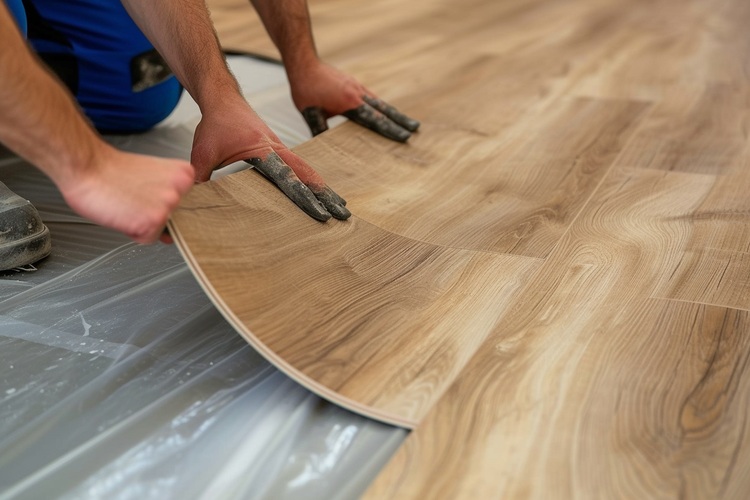Choosing the Right Flooring Company for Quality Installations In 2025
Selecting a flooring installation company requires careful consideration of multiple factors to ensure your project meets expectations. From verifying credentials to evaluating past work and understanding pricing structures, homeowners and business owners face important decisions that impact both aesthetics and long-term durability. This comprehensive guide walks you through the essential steps for making an informed choice when hiring professionals for your flooring needs.

A Guide to Choosing a Flooring Installation Company 2025
When planning a flooring project, the company you choose plays a critical role in determining the outcome. A skilled installer can transform your space with precision and care, while an inexperienced one might leave you with uneven surfaces, gaps, or premature wear. Understanding what to look for in a flooring installation company helps you avoid costly mistakes and ensures your investment delivers lasting value.
Start by identifying companies that specialize in the type of flooring you want installed. Whether you need hardwood, laminate, tile, vinyl, or carpet, working with installers who have specific expertise in your chosen material increases the likelihood of professional results. Many companies offer multiple flooring types, but their proficiency levels may vary across different materials.
Flooring Installation Company Options
The flooring industry includes various types of service providers, each with distinct characteristics. National chains often provide standardized services with extensive product selections and warranties backed by corporate resources. Regional companies typically offer personalized service with deep knowledge of local building codes and climate considerations. Independent contractors may provide competitive pricing and flexible scheduling, though they might have fewer resources for large-scale projects.
When exploring options in your area, consider the scope of services each company provides. Some handle everything from material selection and delivery to installation and post-project cleanup, while others focus solely on the installation phase. Full-service providers can simplify the process, but specialized installers might offer superior craftsmanship in their particular niche.
Online reviews and local referrals provide valuable insights into company reputations. Look for patterns in customer feedback rather than focusing on isolated complaints or praise. Pay attention to comments about punctuality, communication, problem-solving, and how companies handle unexpected issues during installation.
Researching Credentials
Verifying credentials protects you from unqualified installers and potential liability issues. Legitimate flooring companies should carry proper licensing as required by your state or municipality. Licensing requirements vary by location, but they generally ensure installers meet minimum competency standards and follow local building regulations.
Insurance coverage is equally important. Request proof of both general liability insurance and workers compensation coverage. General liability protects your property if damage occurs during installation, while workers compensation covers injuries to crew members on your property. Companies that hesitate to provide insurance documentation should raise immediate concerns.
Manufacturer certifications indicate specialized training in specific flooring products. Many flooring manufacturers offer certification programs that teach proper installation techniques for their materials. Certified installers often qualify you for enhanced product warranties, adding another layer of protection to your investment.
Professional affiliations with organizations like the National Wood Flooring Association or the International Certified Flooring Installers Association demonstrate commitment to industry standards and ongoing education. While not mandatory, these memberships suggest a company takes its craft seriously.
Assessing Experience and Expertise
Experience matters significantly in flooring installation. Ask potential companies how long they have been in business and how many projects similar to yours they have completed. A company with ten years of experience installing commercial tile might not be the best choice for residential hardwood, even though both involve flooring.
Request to see portfolios or photos of completed projects that match your flooring type and project scope. Quality installers take pride in their work and maintain visual records of successful installations. If possible, ask for references from recent clients whose projects resembled yours in size and complexity.
During consultations, evaluate how thoroughly companies assess your space. Professional installers should examine subfloor conditions, measure moisture levels where appropriate, discuss acclimation requirements for certain materials, and identify potential challenges before providing estimates. Companies that offer quick quotes without thorough site evaluation may overlook critical factors that affect installation quality.
Ask detailed questions about their installation process, timeline expectations, and how they handle common complications. Experienced professionals can explain their methods clearly and provide realistic timelines based on your project specifications.
Understanding Pricing and Getting Accurate Estimates
Flooring installation costs vary widely based on material type, room size, subfloor condition, geographic location, and project complexity. Getting detailed written estimates from multiple companies allows for meaningful comparisons. Estimates should itemize material costs, labor charges, removal of existing flooring if needed, subfloor preparation, and any additional services.
Beware of estimates that seem significantly lower than others without clear explanation. Extremely low bids might indicate inexperience, plans to use substandard materials, or intentions to add charges later. Conversely, the highest bid does not automatically guarantee the best quality.
| Service Type | Average Cost Range | Factors Affecting Price |
|---|---|---|
| Hardwood Installation | $6-$12 per square foot | Wood species, finish type, room layout complexity |
| Laminate Installation | $3-$8 per square foot | Quality grade, underlayment requirements, room size |
| Tile Installation | $5-$15 per square foot | Tile material, pattern complexity, surface preparation |
| Vinyl Installation | $2-$8 per square foot | Vinyl type (sheet, plank, tile), adhesive method |
| Carpet Installation | $3-$11 per square foot | Carpet quality, padding type, room configuration |
Prices, rates, or cost estimates mentioned in this article are based on the latest available information but may change over time. Independent research is advised before making financial decisions.
These figures represent typical ranges for professional installation and may not include material costs or special preparation work. Always request itemized estimates that break down all project components for transparency.
Making Your Final Decision
After gathering estimates, checking credentials, and assessing experience, trust your instincts about communication and professionalism. The company you choose should respond promptly to questions, provide clear written agreements, and demonstrate respect for your property and timeline.
Review contracts carefully before signing. Ensure they specify materials by brand and model, include detailed payment schedules tied to project milestones, outline warranty terms, and establish clear timelines with provisions for delays. Never pay the full amount upfront; standard practice involves a deposit with remaining payments due upon satisfactory completion.
Confirm the company will obtain necessary permits if required in your area. Professional installers handle permit applications as part of their service, ensuring work meets local code requirements and passes inspections.
Preparing for Installation Day
Once you have selected a company, prepare your space according to their instructions. Most installers require rooms to be emptied of furniture and personal items. Discuss whether the company provides furniture moving services or if you need to arrange this separately.
Understand the expected timeline and any disruptions to your daily routine. Some flooring types require curing time or generate dust and odors during installation. Plan accordingly, especially if you have pets, children, or health sensitivities.
Maintain open communication throughout the project. Address concerns immediately rather than waiting until completion. Reputable companies welcome feedback and work collaboratively to ensure satisfaction.
Selecting the right flooring installation company involves thorough research, careful evaluation of credentials and experience, and clear communication about expectations and costs. By following these guidelines, you position yourself to make an informed decision that results in beautiful, durable flooring installed by qualified professionals who stand behind their work.




